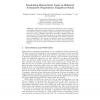Free Online Productivity Tools
i2Speak
i2Symbol
i2OCR
iTex2Img
iWeb2Print
iWeb2Shot
i2Type
iPdf2Split
iPdf2Merge
i2Bopomofo
i2Arabic
i2Style
i2Image
i2PDF
iLatex2Rtf
Sci2ools
ATAL
2007
Springer
2007
Springer
Exploiting Hierarchical Goals in Bilateral Automated Negotiation: Empirical Study
While argumentation-based negotiation has been accepted as a promising alternative to game-theoretic or heuristic based negotiation, no evidence has been provided to confirm this theoretical advantage. We propose a model of bilateral negotiation extending a simple monotonic concession protocol by allowing the agents to exchange information about their underlying interests and possible alternatives to achieve them during the negotiation. We present an empirical study that demonstrates (through simulation) the advantages of this interest-based negotiation approach over the more classic monotonic concession approach to negotiation.
| Added | 07 Jun 2010 |
| Updated | 07 Jun 2010 |
| Type | Conference |
| Year | 2007 |
| Where | ATAL |
| Authors | Philippe Pasquier, Ramon Hollands, Frank Dignum, Iyad Rahwan, Liz Sonenberg |
Comments (0)

